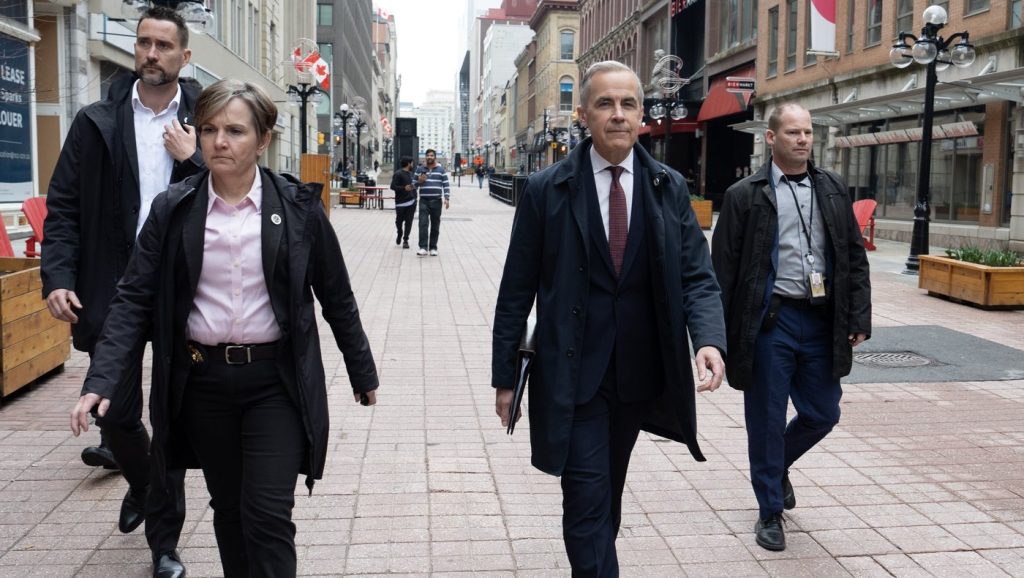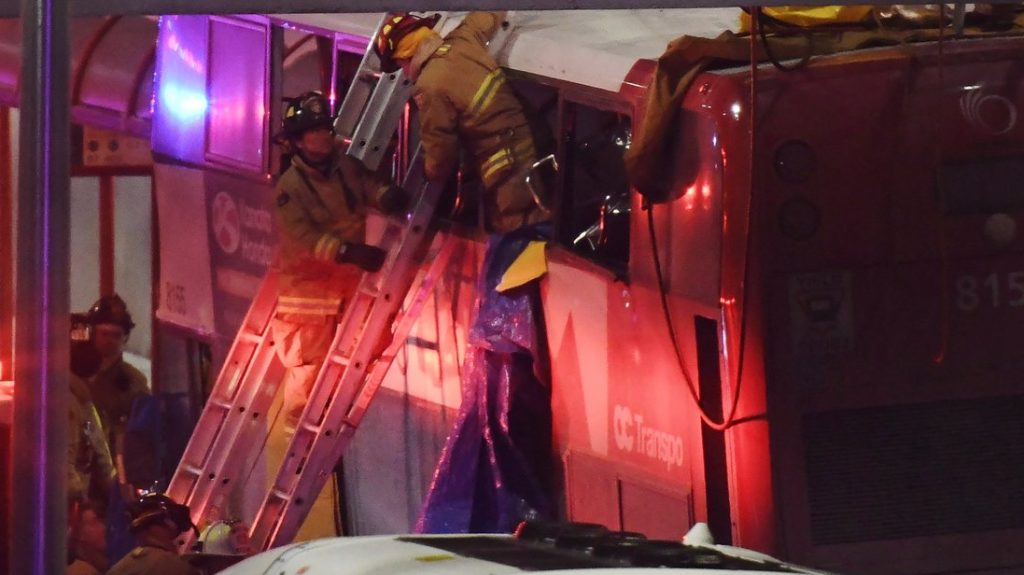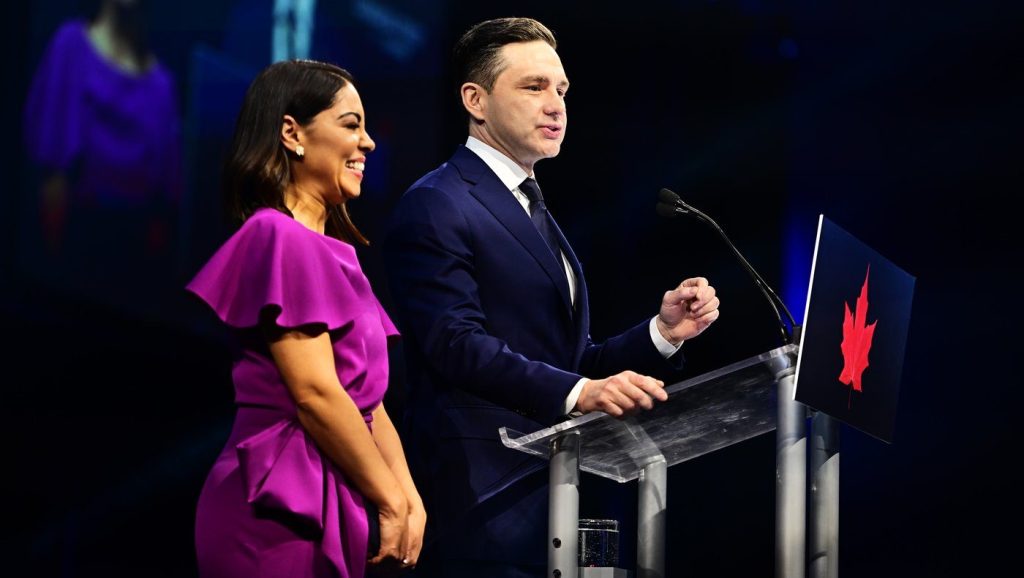French-language debate: Leaders target front-runner Carney, who fends off attacks

Posted Apr 16, 2025 05:02:31 PM.
Last Updated Apr 17, 2025 12:14:49 AM.
With the Liberals leading heavily in the polls less than two weeks away from Canada’s general election, it was expected Mark Carney would be in the crosshairs during Wednesday’s French-language debate in Montreal.
And it didn’t take too long for that to happen — a trend that kept up throughout the debate — with the leaders of the three other main political parties taking aim at Carney and the Liberals whenever possible.
It started with Conservative Leader Pierre Poilievre, who once appeared to be coasting towards an election victory prior to Justin Trudeau stepping down as prime minister. Poilievre attacked the Liberals’ economic policies from the last decade under Trudeau and accused Carney of simply repeating those policies.
“You’re a Liberal, you love to raise taxes. That’s what your party does,” Poilievre said.
“I just got here,” a slightly exasperated Carney replied.
“You were Justin Trudeau’s economic advisor. Are you denying it?” Poilievre hit back, with a grin. The Conservative leader later took a shot at the Liberal leader’s track record as the governor of the Bank of England.
Those jabs set the tone for a confrontational evening that saw leaders argue about the trade war with Donald Trump, the rising cost of living in Canada, pipelines, housing, immigration, and the French language.
It was the first of two debates ahead of the April 28 vote, with the candidates going back at it Thursday for the English debate.
Poilievre’s early attacks on Carney were duplicated — and then some — when Bloc Québécois Leader Yves-François Blanchet and the NDP’s Jagmeet Singh got into the mix.
Blanchet echoed the criticism that Carney was fundamentally similar to his predecessor.
“It’s the same ministers, the same cabinet, the same ideology, the same hostility towards Quebec values,” Blanchet said. “It’s not because you change the leader that the philosophy that you contributed to will change from one day to the next.”
Blanchet added Carney had an unproven track record and no political experience. “You claim to have expertise in crisis management. I haven’t seen any,” Blanchet said.
The Bloc leader also accused him of not working collaboratively with other political leaders in Canada during his brief time as prime minister — before the election was called.
“I never got a call from him. There was no willingness on his part,” Blanchet said.
The Bloc leader maintained the offensive. He clashed with Carney on counter-tariffs on Quebec aluminum, saying they were hurting the province’s industry. They also disagreed on pipelines, with Blanchet arguing the Liberal leader was sending mixed messages about the possibility of imposing a pipeline on Quebec. Carney denied wanting to do such a thing.

Pipelines were a rare moment when Carney and Poilievre found common ground. The Liberal leader agreed with the Conservative leader’s concerns about Canadian energy passing through the United States.
“Our relationship with the United States has completely changed. So imports from the United States and the geography — as Mr. Poilievre just said — of the pipelines is a national security problem for us,” Carney said. “We have to act.”
It was the first federal debate for front-runners Carney and Poilievre, who also went head to head for the very first time. Blanchet and Singh previously debated other party leaders in 2019 and 2021.
Singh was the candidate who spoke the least during the debate — though moderator Patrice Roy did have to cut his microphone at some point — but the NDP leader was not shy to attack Carney.
He pointed the finger at Carney, for instance, for not increasing employment insurance against the backdrop of American tariffs hurting Canadian workers.
Singh later jumped on an earlier jab by Blanchet — whose dominance in French compared to the other candidates led to multiple colourful soundbites — when he agreed that Carney proposing to increase spending while also promising to make cuts was the equivalent of a “Harry Potter budget,” describing it as magical thinking.
Carney defends himself
Though he at times looked irritated by the barrage, Carney repeatedly defended himself and his record. He listed what he felt he accomplished as prime minister before calling the election.
He cited cutting the carbon tax, negotiating a military partnership with Australia, and starting more intensive trade talks with France and the United Kingdom as his key successes.
He also said he agreed to sit down with Trump after the election to craft a new bilateral agreement, if elected.
Over and over, Carney said he was not the country’s leader long enough to justify the debate attacks.
“I just started as prime minister a month ago,” he told Blanchet at one point.
On being called a copy of Trudeau, Carney — while speaking to reporters after the debate — praised the former prime minister for “building a better country,” but distanced himself by saying his emphasis is “more on the economy” than Trudeau’s was.

And there were no major slip-ups from Carney, whose lack of proficiency in French has long been criticized — especially in Quebec.
At one point in the debate, when pressed by Blanchet on the carbon tax, Carney appeared to suggest Quebecers were in line to receive a carbon-tax rebate, which is not the case. The confusion stemmed from Carney’s slight mispronunciation of the word “hors” in French — meaning “except for” or “outside of.”
“That does not exist,” a confused Blanchet retorted. Even moderator Roy was puzzled.
But it was nothing like the stumble during February’s Liberal leadership debate in French, during which Carney misspoke by saying all four Liberal candidates on stage were in agreement “with” Hamas in an exchange about the war in Gaza. Carney quickly clarified after being corrected by former Deputy Prime Minister Chrystia Freeland.
‘We can’t control Trump’
The leaders began the debate by sparring over how to respond to the trade war with the United States and pitching themselves as the best one to negotiate with Trump.
Poilievre said that on his first day in office, he would open negotiations with Trump on an agreement put an end to tariffs.
“We can’t control Trump. So at the same time, we need to control what we can,” Poilievre said.
“That means reversing the Liberal economic policies which have weakened our country, unlocking out (natural) resources, cut taxes, bring jobs here to face Trump with strength.”
Carney said Canada needs to plan for the worst-case scenario and have a strategy to build a stronger economy.
“It’s those elements that will work with Trump. He respects strength, he respects people who know how the world and the private sector works,” Carney said.
“Canada has to create other options, new international trade partners, and that’s what I promise.”

Blanchet said Canada needs to align with countries that are being affected by U.S. tariffs and “negotiate rationally.”
“Trump will hang himself with his own cord because his measures are extremely toxic to the U.S. economy,” he said. “In the meantime, he will also create damage everywhere.”
Singh said Canada needs to prioritize what matters most and invest rather than cut.
“Like our agriculture, our culture, our French language; not sacrifice it,” Singh said.
“A profound value for us is taking care of each other. How we do that is reinforcing our health-care system, not Americanizing it.”
Cutting out American products
The party leaders were also asked which U.S. products they’ve cut from their daily lives.
All other party leaders took a dig at Carney by saying they no longer buy U.S. strawberries. In a recent interview with a Quebec talk show, when asked if he still buys U.S. strawberries, Carney said he doesn’t buy his own groceries.
“No more wine, no more American alcohol,” Carney said.
“I do my own groceries, and I cook myself. So lots of fruit,” Singh said.
“This is a delicious conversation,” Poilievre quipped, adding he buys Canadian beef.

Earlier in the debate Carney cited his promises to double housing construction, while Poilievre vowed to cut income taxes and GST on new homes.
Blanchet said Quebec should have the right to run its own economy using its own natural resources.
Singh prioritized health care, noting his party’s efforts to secure dental and pharmacare programs under the previous government.
It’s Singh’s continual emphasis on health care — even during other topics — that led to his microphone being cut when he ignored the moderator’s prompts. A frustrated but passionate Singh defended his commitment to the cause at his next opportunity to speak.
“During this debate, I’ve tried to speak about health a few times,” the NDP leader said during a question on the French language. “And Mr. Roy stopped me many times. And look at my speaking time on the clock, it’s much less.
“It’s a question of identity of this country. I’m passionate on health issues. And every time I tried speaking about it, Mr. Roy called me out and stopped me. It’s not fair.”
The co-leader of the Green Party was initially slated to take part in the debate, but was disinvited hours before the start time; organizers said the party failed to meet its participation criteria.
The debate was originally scheduled for 8 p.m. EDT but was moved two hours earlier because the Montreal Canadiens played a crucial hockey game Wednesday night. They beat the Carolina Hurricanes to clinch a spot in the NHL playoffs.
–With files from The Canadian Press








